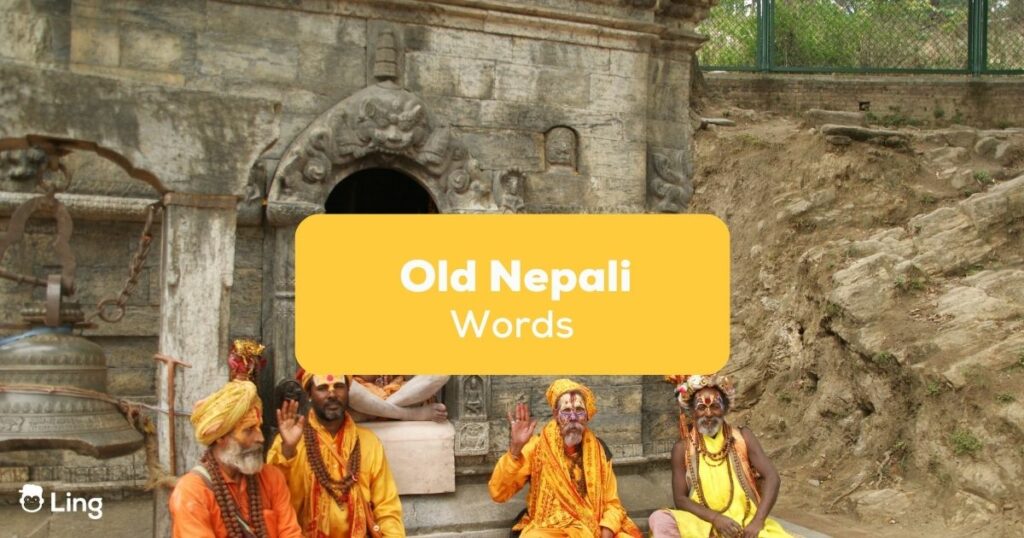Does the origin of the words a country speaks ever pique your interest? Words that existed for centuries tell a lot about the history of what one’s land has been through. In this blog post, we’ll take a quick sneak peek of old Nepali words and how they came to be.
The origin of certain words in Nepali can really pique any lexicon explorer’s interest. Who wouldn’t be intrigued by the terms used by our great-grandparents? These words are more than just ancient terms used by our ancestors, they reflect the cultural tapestry of a country alongside bits of its history.
These old Nepali words are like windows into a world long past, giving us a glimpse of the roots of their culture and traditions from the past. So, come along as we travel back in time and unlock these interesting and meaningful words!
List Of Old Nepali Words
Before delving into the old words, it’s crucial to understand the origins of the Nepali language. These amazing modern Indo-Aryan languages come has deep roots, and in Nepal’s case, it was from the Tibeto-Burman Family. Another fun fact that you might want to know was this native language was also known as Gorkhali or Khas-kura, and it has transformed over the centuries.
Nonetheless, we can’t eliminate the existence of old Nepali words that gave life to modern ones. Join us as we uncover the roots of old Nepali words and their relevance in the culture and history of the country.

1. आकाश (Aakash)
The vast skies are one thing that we often look at, whether it be day or night, we admire the beauty it offers us. Would you believe it if we say that this word is one of the oldest terms that is still used today? In Nepal, they call it आकाश (Aakash), and it has an interesting significance in the literature and folklore in Nepal. It serves as a symbol of freedom and spiritual enlightenment.

2. भूमि (Bhoomi)
Some words in Nepali may sound like just one word that they use in their daily lives. But what makes भूमि (Bhoomi) important in this post is its Sanskrit origins and their relevance in the Nepali culture. This word translates to Earth/Land, and it is well-valued by people who work in the agricultural sector, this word is also crucial in the literature and folklore of Nepali people. It comes with a definition of a deep connection between man and the land they live in.

3. धुंगा (Dhunga)
Despite being a minuscule part of the Nepali dictionary, the term धुङ्गा (Dhunga), which translates to stone, still plays a big role in the Nepalese vocabulary. We all know that without this inanimate object, the majestic temples and monuments in the country won’t exist today. Plus, common words like this hold a deeper symbolism than we think, as in the old Nepali language, it represents resilience and heritage.

4. घर (Ghar)
One’s home is always seen as a source of warmth, comfort, and familiarity, and in Nepali, they call it घर (Ghar). You might wonder, how is it relevant in this list of old Nepali words? Houses are not just shelters but also a nexus of familial traditions, rituals, and memories. Moreover, it was also a symbol of the history, present, and future of the country’s social and cultural fabric.
5. संसार (Sansar)
It’s not surprising to know that this word is still used today. You see, this is an important term as it reflects the philosophy of different religious groups. If you look up the translation of संसार (Sansar) you’d learn that its meaning is “World/Family” in English. It also refers to life, death, birth, and re-birth, it’s even called “Samsara” in Sanskrit.
6. आत्मा (Atma)
At some point, these words in Nepali are somehow connected to each other. If you ever wonder what the eternal soul or true self is in the Nepali language, then here’s the Nepali word you’ll get: आत्मा (Atma). It originated from the roots of Hinduism, Buddhism, and other indigenous beliefs of the region. This becomes an important word in the Nepali language because it represents the importance of introspection, righteousness, and self-awareness in one’s journey through life and beyond.
7. वीर (Veer)
Many Indic languages, including Old Nepali, share the word वीर (Veer), which is generally translated as “brave” or “heroic.” It has tremendous significance for understanding Old Nepali and regional history. While it also became important to stories of gods and goddesses, showing different forms of bravery and heroism.
Why Should We Preserve Old Words?
Enjoyed this post? Perhaps Nepali speakers had a blast learning about these unique words in their official language. Still, there are more words to unlock for a learner such as yourself. You see, Nepal has plenty of dialects, meaning you might want to spend more time discovering other terms used in Nepali. There are plenty of ways to master this language, and one of them is by using Ling.
No one likes boring and standard learning styles. That’s so last season! With the Ling app, you can learn by playing interactive games that’ll keep you company as you make progress. You may even try to master 60 other languages that it offers if you want to add more to your plate. So, are you ready to start a spectacular journey with us? Download Ling today on Play Store and App Store for FREE!



































































